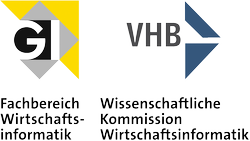Track 2: Integrated Systems in Manufacturing Industries
For some years society has been clearly experiencing a return of the real economy's importance. Germany in particular demonstrates the benefits associated with a well-developed industrial base. If such a base should be successful in global markets, it has to remain competitive at the highest level, either through the uniqueness of its products or the efficiency of its production. Information technology still plays a crucial role in this context.
On the one hand, the track focuses the already deeply integrated traditional enterprise systems (ERP, PPC, SCM, CRM, SRM), which are essential in high-performance industrial companies. These systems often have an insufficient integration with production systems (e.g. MES) and also need to improve their external integration capabilities in order to support cooperation in value-creating networks. The integration of new concepts into these systems, such as event handling, in memory computing or master data management provides promising opportunities and creates new challenges at the same time. In addition, it becomes increasingly evident that the requirements on such systems and their implementation processes are different from the perspective of small and medium-sized manufacturing enterprises as compared to those of large industrial companies. New delivery models, such as software as a service, may provide a new starting point in this case; but research is still not comprehensive enough in regard to many aspects, e.g. the integration with systems running locally.
On the other hand, exceptional features or individual components create unique solutions for the industrial field which can be well integrated into the applications landscape owing to modern integration architectures. We are also interested in components embedded in manufactured products providing special value-adding features.
Finally, this track also focuses on concepts lead the way to so-called cyber-physical systems through integration of IT and real-world objects.
In addition to papers concerned with industrial systems or products and their underlying concepts, we also welcome papers addressing issues related to the development, customization, implementation, adoption and success of such systems. The main topics are the following:
Topics
Enterprise applications (ERP, SCM, CRM, SRM)
Future of ERP systems (e.g. agility, architecture, business models)
Process-centric development of ERP systems (BPM, MDSD)
Production management and production-related systems (MRP, MES, event handling systems), digital factory
Integration of e-business and e-commerce applications in backend business software
Inter-organizational information systems and IS in value-creating networks (B2B integration, IOS)
Information systems in product development and throughout the product life cycle (PLM)
Applications in manufacturing industries (automotive, chemicals / pharmaceuticals, machinery, etc.)
IT in small and medium-sized manufacturing enterprises
IT in manufactured products (embedded systems, smart products)
Internet of things, cyber-physical systems (CPS)
Track Chairs
Prof. Dr. Petra Schubert, University Koblenz-Landau, Germany
Prof. Dr. Susanne Strahringer, Technical University Dresden, Germany
Programmkomitee
PD Dr. Peter Fettke, Saarland University, Germany
Prof. Dr. Andreas Fink, Helmut-Schmidt-University, Germany
Prof. Dr. -Ing. Norbert Gronau, University Potsdam, Germany
Prof. Dr. Wolfgang Maass, Saarland University, Germany
Prof. Dr. Jorge Marx Gómez, Carl von Ossietzky University Oldenburg, Germany
Prof. Dr. Uwe Kubach, SAP Research, Germany
Prof. Dr. Uwe Leimstoll, University of Applied Sciences and Art Northwestern Switzerland, Switzerland
Prof. Dr. Boris Otto, University St. Gallen, Switzerland
Prof. Dr. Matthias Schumann, Georg-August-University Göttingen, Germany
Prof. Dr. Oliver Thomas, University Osnabrück,Germany
Prof. Dr. Klaus Turowski, Otto-von-Guericke-University Magdeburg, Germany
Prof. Dr. Stefan Voß, University Hamburg, Germany
PD Dr. Axel Winkelmann, University Münster, Germany














